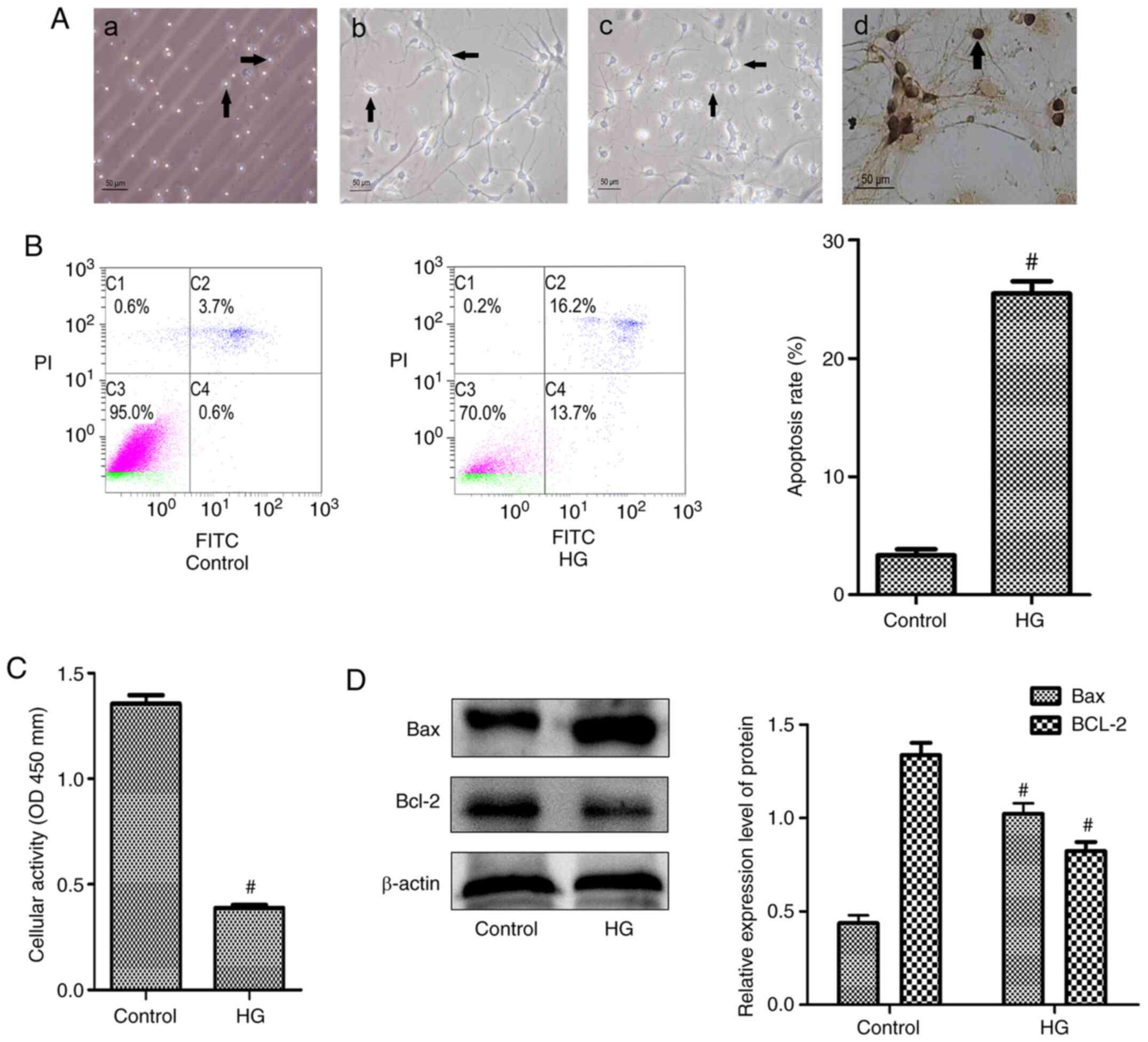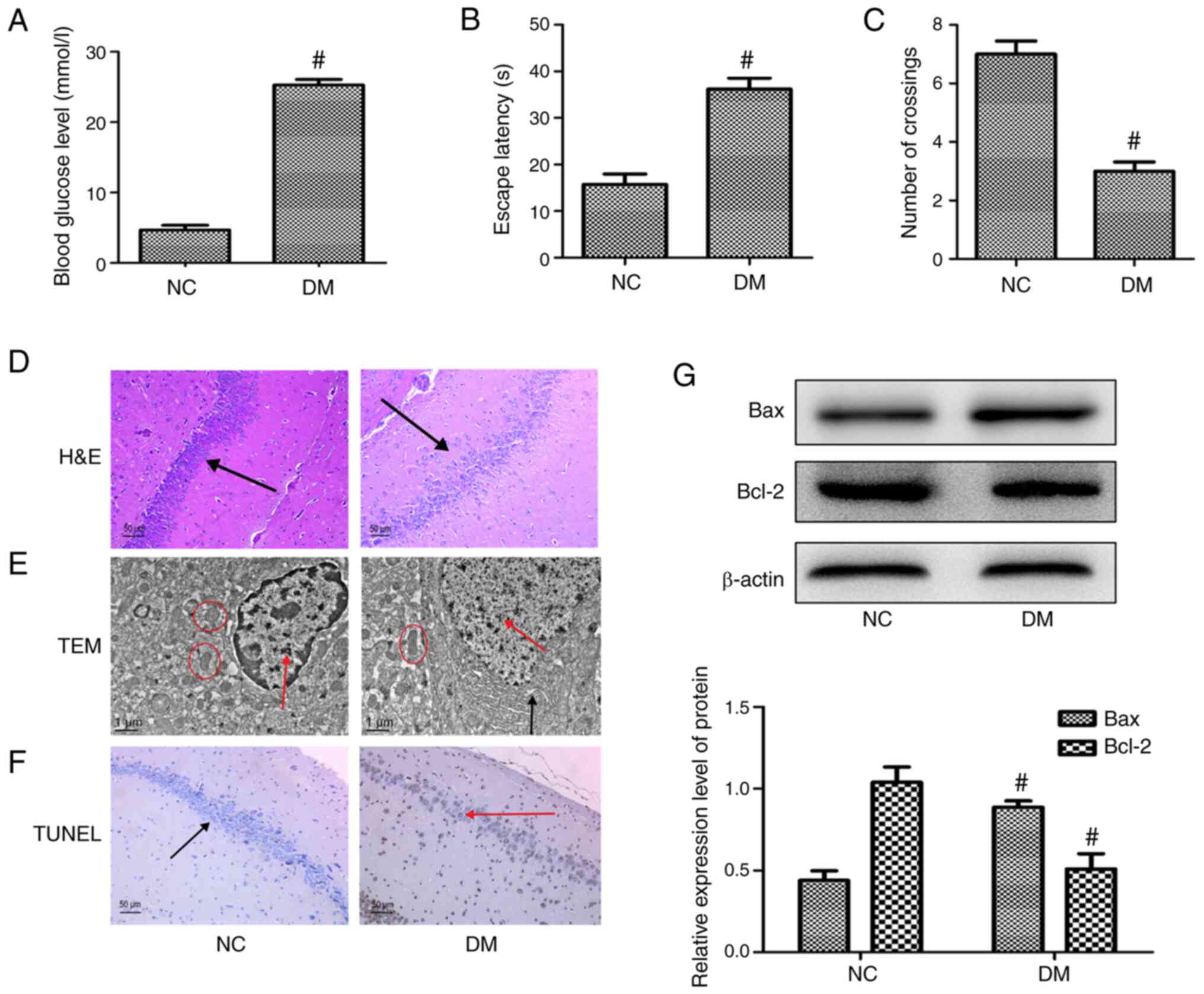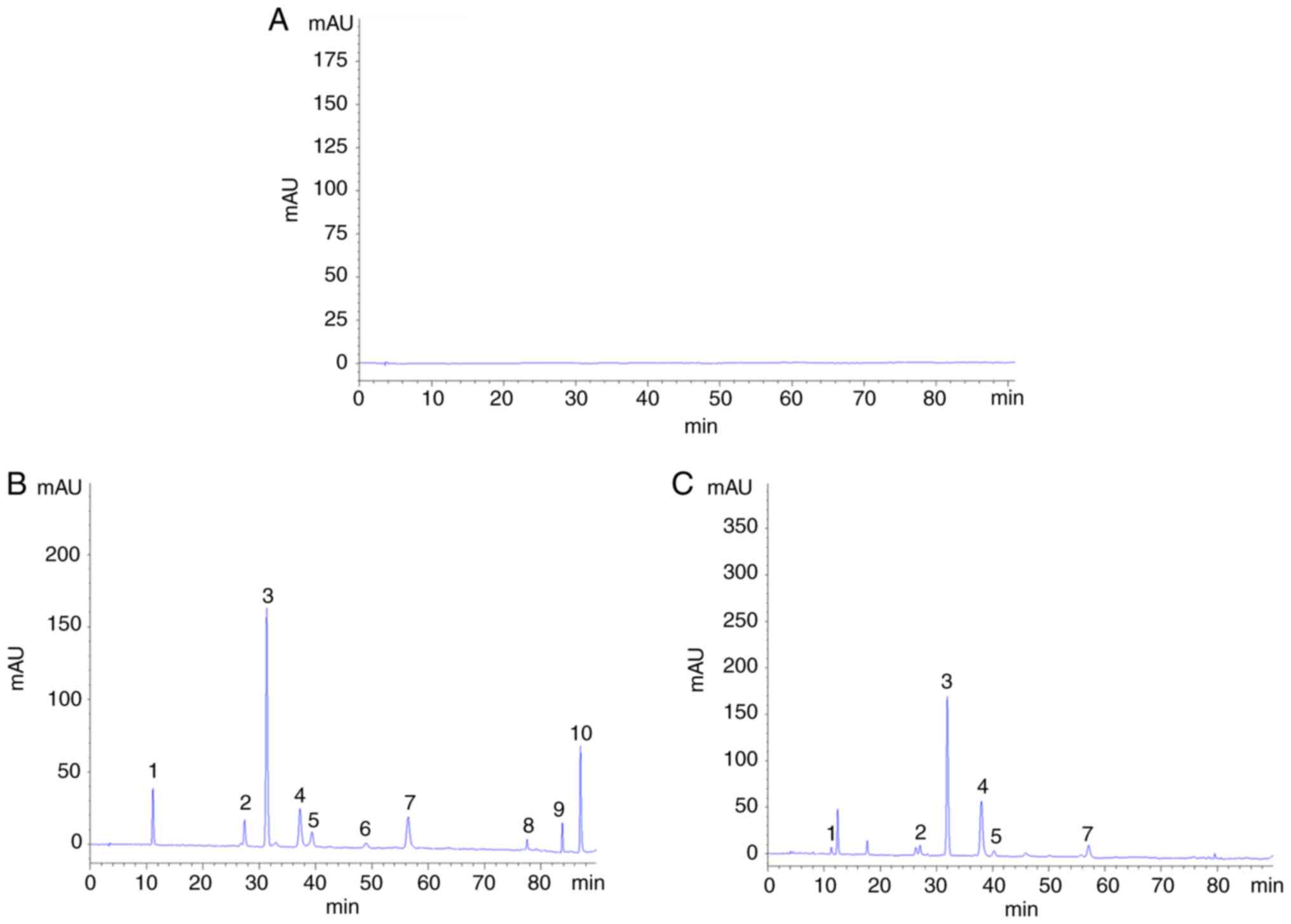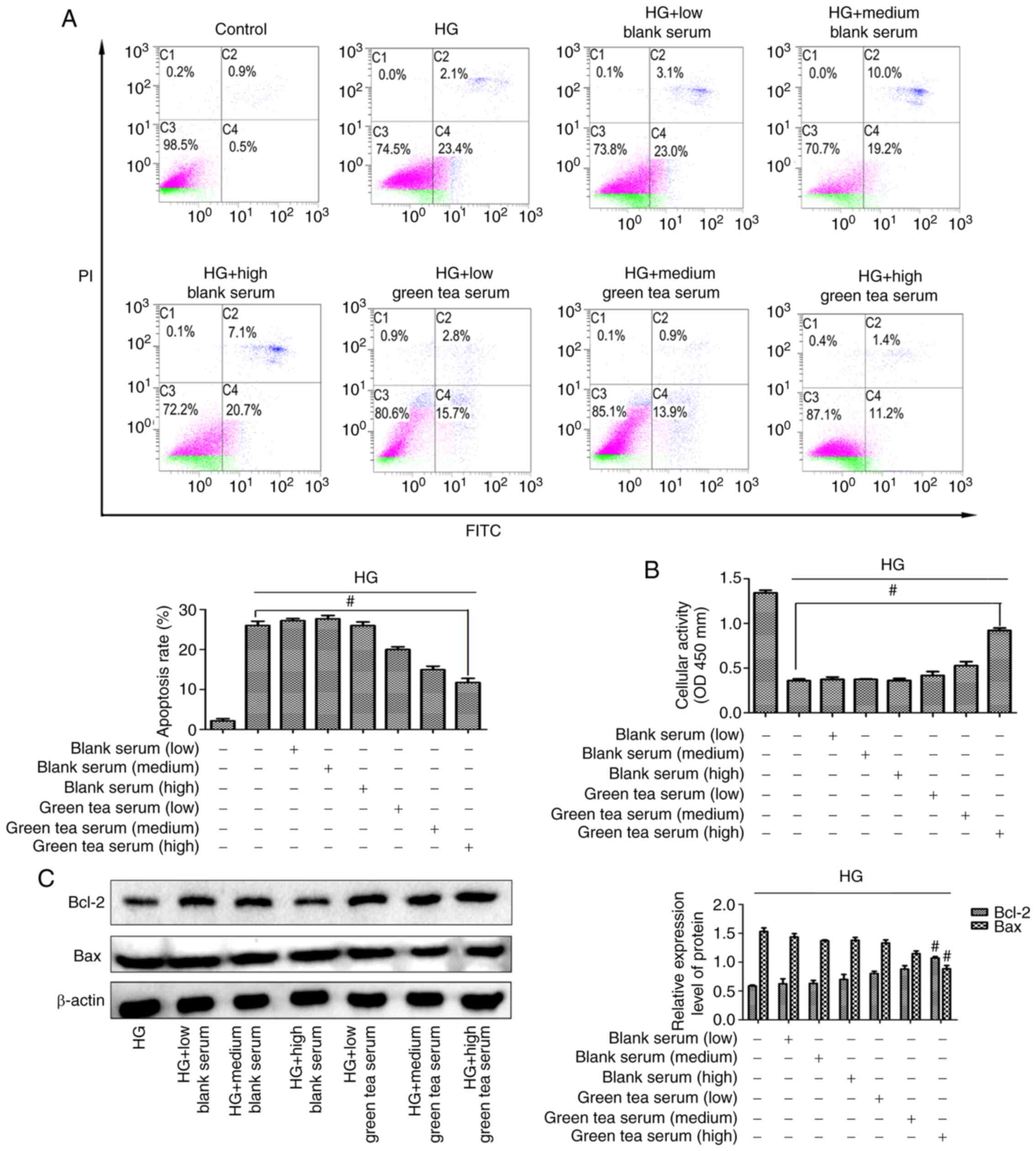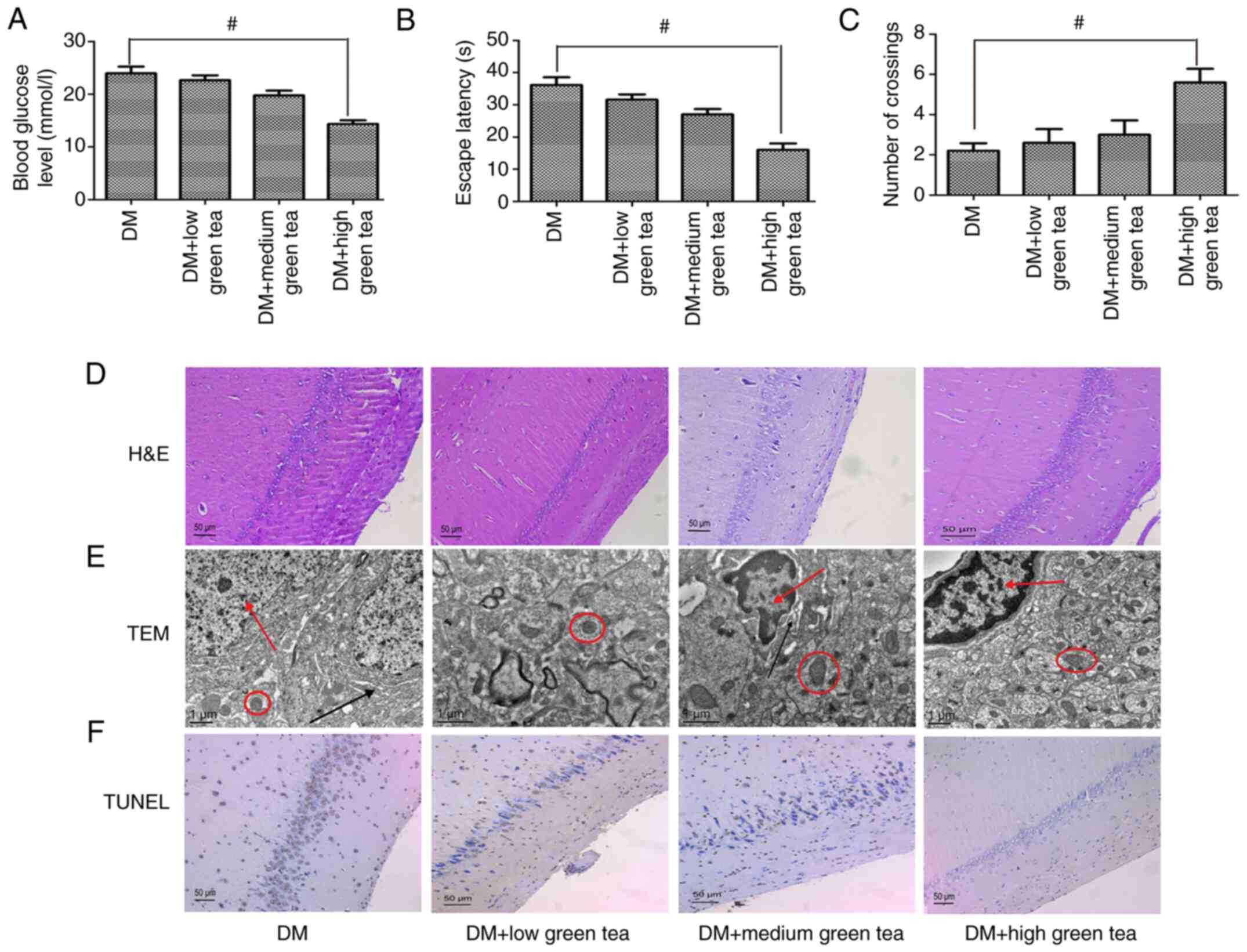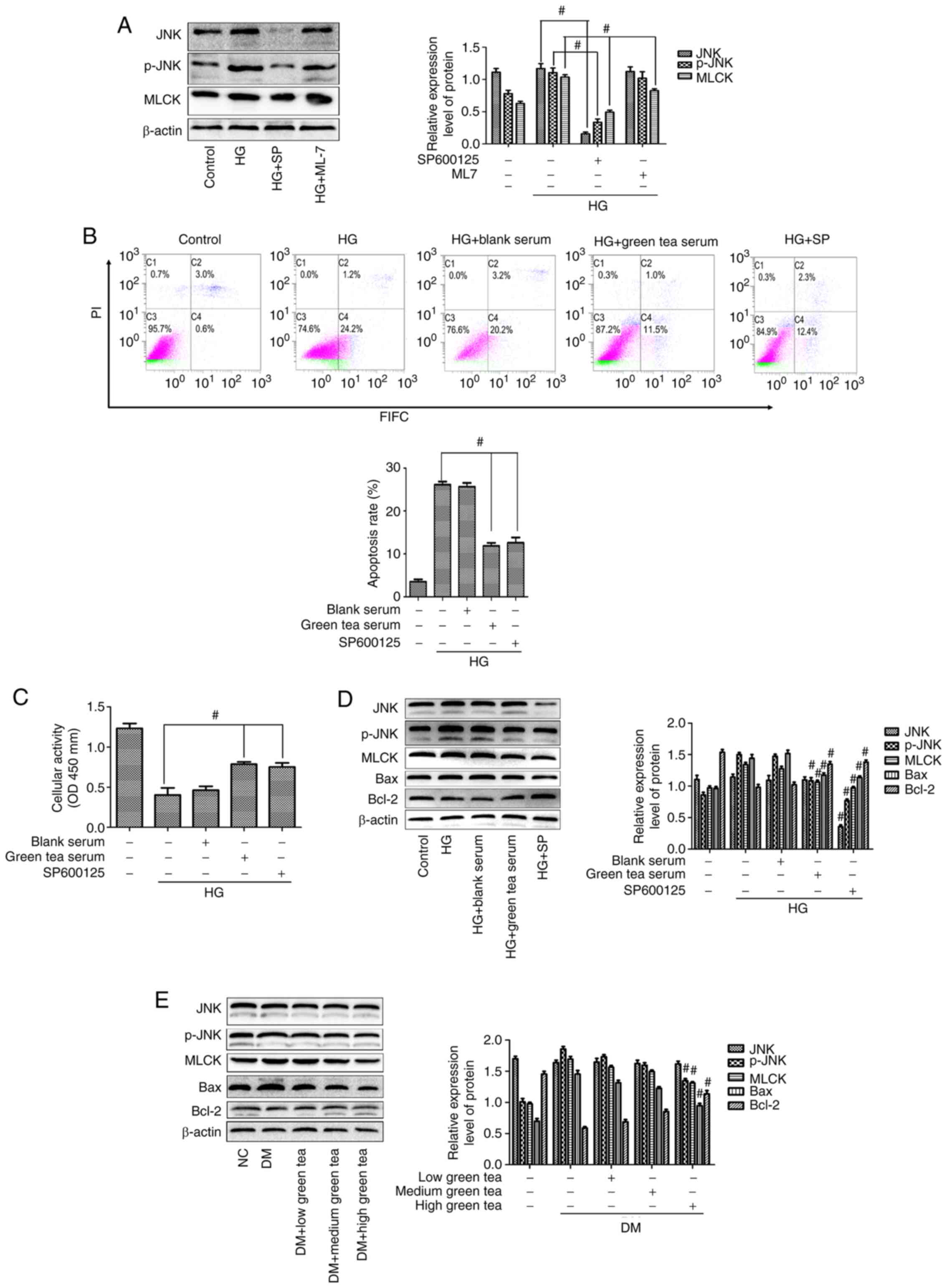|
1
|
Dong M, Ren M, Li C, Zhang X, Yang C, Zhao
L and Gao H: Analysis of metabolic alterations related to
pathogenic process of diabetic encephalopathy rats. Front Cell
Neurosci. 12:5272019. View Article : Google Scholar : PubMed/NCBI
|
|
2
|
Díaz-Gerevini GT, Daín A, Pasqualini ME,
López CB, Eynard AR and Repossi G: Diabetic encephalopathy:
Beneficial effects of supplementation with fatty acids ω3 and
nordihydroguaiaretic acid in a spontaneous diabetes rat model.
Lipids Health Dis. 18:432019. View Article : Google Scholar
|
|
3
|
Liu LJ, Lu XJ, Gao JM, Wang RJ and Cheng
GX: Effect of the APP17 peptide on diabetic encephalopathy. J Biol
Regul Homeost Agents. 33:251–257. 2019.PubMed/NCBI
|
|
4
|
Kim TW and Park HS: Physical exercise
improves cognitive function by enhancing hippocampal neurogenesis
and inhibiting apoptosis in male offspring born to obese mother.
Behav Brain Res. 347:360–367. 2018. View Article : Google Scholar : PubMed/NCBI
|
|
5
|
Zhu S, Min D, Zeng J, Ju Y, Liu Y and Chen
X: Transplantation of stem cells from human exfoliated deciduous
teeth decreases cognitive impairment from chronic cerebral ischemia
by reducing neuronal apoptosis in rats. Stem Cells Int.
2020:63930752020. View Article : Google Scholar : PubMed/NCBI
|
|
6
|
Yu N, Huang Y, Jiang Y, Zou L, Liu X, Liu
S, Chen F, Luo J and Zhu Y: Ganoderma lucidum triterpenoids
(GLTs) reduce neuronal apoptosis via inhibition of ROCK signal
pathway in APP/PS1 transgenic Alzheimer's disease mice. Oxid Med
Cell Longev. 2020:98940372020. View Article : Google Scholar : PubMed/NCBI
|
|
7
|
Bhusal A, Rahman MH, Lee IK and Suk K:
Role of hippocampal lipocalin-2 in experimental diabetic
encephalopathy. Front Endocrinol (Lausanne). 10:252019. View Article : Google Scholar : PubMed/NCBI
|
|
8
|
Song Y, Liu P, Li Z, Shi Y, Huang J, Li S,
Liu Y, Zhang Z, Wang Y, Zhu W, et al: The effect of myosin light
chain kinase on the occurrence and development of intracranial
aneurysm. Front Cell Neurosci. 12:4162018. View Article : Google Scholar : PubMed/NCBI
|
|
9
|
Mizui T, Sekino Y, Yamazaki H, Ishizuka Y,
Takahashi H, Kojima N, Kojima M and Shirao T: Myosin II ATPase
activity mediates the long-term potentiation-induced exodus of
stable F-actin bound by drebrin A from dendritic spines. PLoS One.
9:e853672014. View Article : Google Scholar : PubMed/NCBI
|
|
10
|
Li L, Wu X, Yue HY, Zhu YC and Xu J:
Myosin light chain kinase facilitates endocytosis of synaptic
vesicles at hippocampal boutons. J Neurochem. 138:60–73. 2016.
View Article : Google Scholar : PubMed/NCBI
|
|
11
|
Zhang HF, Li TB, Liu B, Lou Z, Zhang JJ,
Peng JJ, Zhang XJ, Ma QL, Peng J and Luo XJ: Inhibition of myosin
light chain kinase reduces NADPH oxidase-mediated oxidative injury
in rat brain following cerebral ischemia/reperfusion. Naunyn
Schmiedebergs Arch Pharmacol. 388:953–963. 2015. View Article : Google Scholar : PubMed/NCBI
|
|
12
|
Kuo CY, Chou TY, Chen CM, Tsai YF, Hwang
GY and Hwang TL: Hepatitis B virus X protein disrupts stress fiber
formation and triggers apoptosis. Virus Res. 175:20–29. 2013.
View Article : Google Scholar : PubMed/NCBI
|
|
13
|
He Y, Wang F, Chen S, Liu M, Pan W and Li
X: The protective effect of radix polygoni multiflori on diabetic
encephalopathy via regulating myosin light chain kinase expression.
J Diabetes Res. 2015:4847212015. View Article : Google Scholar : PubMed/NCBI
|
|
14
|
Zhu L, Li C, Du G, Pan M, Liu G, Pan W and
Li X: High glucose upregulates myosin light chain kinase to induce
microfilament cytoskeleton rearrangement in hippocampal neurons.
Mol Med Rep. 18:216–222. 2018.PubMed/NCBI
|
|
15
|
Akchiche N, Bossenmeyer-Pourié C, Pourié
G, Koziel V, Nédélec E, Guéant JL and Daval JL: Differentiation and
neural integration of hippocampal neuronal progenitors: Signaling
pathways sequentially involved. Hippocampus. 20:949–961.
2010.PubMed/NCBI
|
|
16
|
Zhao Y, Xin Y and Chu H: MC4R is involved
in neuropathic pain by regulating JNK signaling pathway after
chronic constriction injury. Front Neurosci. 13:9192019. View Article : Google Scholar : PubMed/NCBI
|
|
17
|
Jiang X, Kannan A and Gangwani L:
ZPR1-dependent neurodegeneration is mediated by the JNK signaling
pathway. J Exp Neurosci. 13:11790695198679152019. View Article : Google Scholar : PubMed/NCBI
|
|
18
|
Li Q, Xue AY, Li ZL and Yin Z: Liraglutide
promotes apoptosis of HepG2 cells by activating JNK signaling
pathway. Eur Rev Med Pharmacol Sci. 23:3520–3526. 2019.PubMed/NCBI
|
|
19
|
Wei H, Ren Z, Tang L, Yao H, Li X, Wang C,
Mu C, Shi C and Wang H: JNK signaling pathway regulates the
development of ovaries and synthesis of vitellogenin (Vg) in the
swimming crab Portunus trituberculatus. Cell Stress Chaperones.
25:441–453. 2020. View Article : Google Scholar : PubMed/NCBI
|
|
20
|
Suzuki T, Pervin M, Goto S, Isemura M and
Nakamura Y: Beneficial effects of tea and the green tea catechin
epigallocatechin-3-gallate on obesity. Molecules. 21:E13052016.
View Article : Google Scholar
|
|
21
|
Di Lorenzo A, Nabavi SF, Sureda A,
Moghaddam AH, Khanjani S, Arcidiaco P, Nabavi SM and Daglia M:
Antidepressive-like effects and antioxidant activity of green tea
and GABA green tea in a mouse model of post-stroke depression. Mol
Nutr Food Res. 60:566–579. 2016. View Article : Google Scholar : PubMed/NCBI
|
|
22
|
Pervin M, Unno K, Takagaki A, Isemura M
and Nakamura Y: Function of green tea catechins in the Brain:
Epigallocatechin gallate and its metabolites. Int J Mol Sci.
20:E36302019. View Article : Google Scholar : PubMed/NCBI
|
|
23
|
Liu S, Liu G, Xu Y, Gao C, Pan W and Li X:
Protective effect of green tea on hippocampal neurons in rats under
high glucose. Shandong Medicin. 58:35–39. 2018.(In Chinese).
PubMed/NCBI
|
|
24
|
Huang Y, Shi T, Luo X, Xiong H, Min F,
Chen Y, Nie S and Xie M: Determination of multi-pesticide residues
in green tea with a modified QuEChERS protocol coupled to
HPLC-MS/MS. Food Chem. 275:255–264. 2019. View Article : Google Scholar : PubMed/NCBI
|
|
25
|
Wu H and Li S: Long non-coding RNA MT1JP
exerts anti-cancer effects in breast cancer cells by regulating
miR-92-3p. Gen Physiol Biophys. 39:59–67. 2020. View Article : Google Scholar : PubMed/NCBI
|
|
26
|
Hsu MH, Sheen JM, Chen YC, Yu HR, Tain YL
and Huang LT: Rats with prenatal dexamethasone exposure and
postnatal high-fat diet exhibited insulin resistance, and spatial
learning and memory impairment: Effects of enriched environment.
Neuroreport. 31:265–273. 2020. View Article : Google Scholar : PubMed/NCBI
|
|
27
|
Wang B, Huang J, Li J and Zhong Y: Control
of macrophage autophagy by miR-384-5p in the development of
diabetic encephalopathy. Am J Transl Res. 10:511–518.
2018.PubMed/NCBI
|
|
28
|
Kakutani S, Watanabe H and Murayama N:
Green tea intake and risks for Dementia, Alzheimer's disease, mild
cognitive impairment, and cognitive impairment: A systematic
review. Nutrients. 11:E11652019. View Article : Google Scholar : PubMed/NCBI
|
|
29
|
Zhai Y, Meng X, Ye T, Xie W, Sun G and Sun
X: Inhibiting the NLRP3 inflammasome activation with MCC950
ameliorates diabetic encephalopathy in db/db mice. Molecules.
23:E5222018. View Article : Google Scholar
|
|
30
|
Jing YH, Zhang L, Gao LP, Qi CC, Lv DD,
Song YF, Yin J and Wang DG: Autophagy plays beneficial effect on
diabetic encephalopathy in type 2 diabetes: Studies in vivo and in
vitro. Neuroendocrinol Lett. 38:27–37. 2017.PubMed/NCBI
|
|
31
|
Wang Z, Huang Y, Cheng Y, Tan Y, Wu F, Wu
J, Shi H, Zhang H, Yu X, Gao H, et al: Endoplasmic reticulum
stress-induced neuronal inflammatory response and apoptosis likely
plays a key role in the development of diabetic encephalopathy.
Oncotarget. 7:78455–78472. 2016. View Article : Google Scholar : PubMed/NCBI
|
|
32
|
Wang S, Ren X, Hu X, Zhou L, Zhang C and
Zhang M: Cadmium-induced apoptosis through reactive oxygen
species-mediated mitochondrial oxidative stress and the JNK
signaling pathway in TM3 cells, a model of mouse Leydig cells.
Toxicol Appl Pharmacol. 368:37–48. 2019. View Article : Google Scholar : PubMed/NCBI
|
|
33
|
Wang T, Li X, Fan L, Chen B, Liu J, Tao Y
and Wang X: Negative pressure wound therapy promoted wound healing
by suppressing inflammation via down-regulating MAPK-JNK signaling
pathway in diabetic foot patients. Diabetes Res Clin Pract.
150:81–89. 2019. View Article : Google Scholar : PubMed/NCBI
|
|
34
|
Liu J, Zhou S, Qian X, Zhang Y and Zhao J:
Over-expressed Bax inhibitor 1 (BI-1) inhibits apoptosis of
hippocampal neurons via endoplasmic reticulum IRE1-JNK pathway in
rats with subarachnoid hemorrhage. Xibao Yu Fenzi Mianyixue Zazhi.
33:1316–1322. 2017.(In Chinese). PubMed/NCBI
|
|
35
|
Cai Y, Jiang W, Zhou AL, Zhou M and Xu L:
Effect of oxymatrine on apoptosis of hippocampal neurons by p38/JNK
signaling pathway. Zhongguo Zhongyao Zazhi. 42:731–738. 2017.(In
Chinese). PubMed/NCBI
|
|
36
|
Kim JM, Park SK, Guo TJ, Kang JY, Ha JS,
Lee S, Lee U and Heo HJ: Anti-amnesic effect of Dendropanax
morbifera via JNK signaling pathway on cognitive dysfunction in
high-fat diet-induced diabetic mice. Behav Brain Res. 312:39–54.
2016. View Article : Google Scholar : PubMed/NCBI
|
|
37
|
Lou T, Ma J, Xie Y, Yao G, Fan Y, Ma S and
Zou X: Nuanxin capsule enhances cardiac function by inhibiting
oxidative stress-induced mitochondrial dependent apoptosis through
AMPK/JNK signaling pathway. Biomed Pharmacother. 135:1111882021.
View Article : Google Scholar : PubMed/NCBI
|
|
38
|
Wang S, He B, Hang W, Wu N, Xia L, Wang X,
Zhang Q, Zhou X, Feng Z, Chen Q, et al: Berberine alleviates tau
hyperphosphorylation and axonopathy-associated with diabetic
encephalopathy via restoring PI3K/Akt/GSK3β pathway. J Alzheimers
Dis. 65:1385–1400. 2018. View Article : Google Scholar : PubMed/NCBI
|
|
39
|
Lei S, Czerwinska E, Czerwinski W, Walsh
MP and MacDonald JF: Regulation of NMDA receptor activity by
F-actin and myosin light chain kinase. J Neurosci. 21:8464–8472.
2001. View Article : Google Scholar : PubMed/NCBI
|
|
40
|
Kim DY and Helfman DM: Loss of MLCK leads
to disruption of cell-cell adhesion and invasive behavior of breast
epithelial cells via increased expression of EGFR and ERK/JNK
signaling. Oncogene. 35:4495–4508. 2016. View Article : Google Scholar : PubMed/NCBI
|
|
41
|
He Q, Bao L, Zimering J, Zan K, Zhang Z,
Shi H, Zu J, Yang X, Hua F, Ye X, et al: The protective role of
(−)-epigallocatechin-3-gallate in thrombin-induced neuronal cell
apoptosis and JNK-MAPK activation. Neuroreport. 26:416–423. 2015.
View Article : Google Scholar : PubMed/NCBI
|
|
42
|
Xu H, Wu Q, Peng C and Zhou L: Study on
the antiviral activity of San Huang Yi Gan Capsule against
hepatitis B virus with seropharmacological method. BMC Complement
Altern Med. 13:2392013. View Article : Google Scholar : PubMed/NCBI
|
|
43
|
Siu WS, Ko CH, Wong HL, Gao S, Shum WT,
Lau CB, Hung LK and Leung PC: Seropharmacological study on
osteogenic effects of post-absorption ingredients of an
osteoprotective herbal formula. Chin J Integr Med. 23:25–32. 2017.
View Article : Google Scholar : PubMed/NCBI
|
|
44
|
Chu KO, Wang CC, Chu CY, Choy KW, Pang CP
and Rogers MS: Uptake and distribution of catechins in fetal organs
following in utero exposure in rats. Hum Reprod. 22:280–287. 2007.
View Article : Google Scholar : PubMed/NCBI
|
|
45
|
Molino S, Dossena M, Buonocore D, Ferrari
F, Venturini L, Ricevuti G and Verri M: Polyphenols in dementia:
From molecular basis to clinical trials. Life Sci. 161:69–77. 2016.
View Article : Google Scholar : PubMed/NCBI
|
|
46
|
Spagnuolo C, Moccia S and Russo GL:
Anti-inflammatory effects of flavonoids in neurodegenerative
disorders. Eur J Med Chem. 153:105–115. 2018. View Article : Google Scholar : PubMed/NCBI
|
|
47
|
Ortiz-López L, Márquez-Valadez B,
Gómez-Sánchez A, Silva-Lucero MD, Torres-Pérez M,
Téllez-Ballesteros RI, Ichwan M, Meraz-Ríos MA, Kempermann G and
Ramírez-Rodríguez GB: Green tea compound
epigallo-catechin-3-gallate (EGCG) increases neuronal survival in
adult hippocampal neurogenesis in vivo and in vitro. Neuroscience.
322:208–220. 2016. View Article : Google Scholar
|
|
48
|
Afzal M, Safer AM and Menon M: Green tea
polyphenols and their potential role in health and disease.
Inflammopharmacology. 23:151–161. 2015. View Article : Google Scholar : PubMed/NCBI
|















